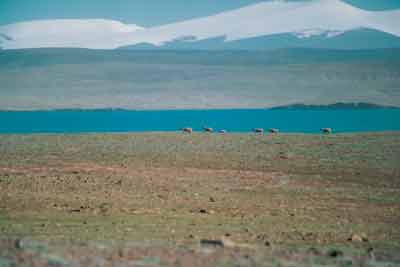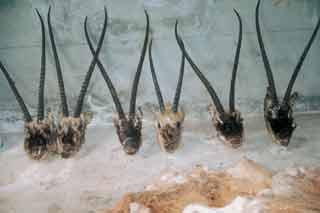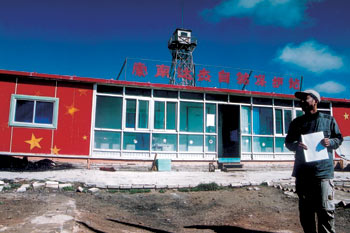| Promoting an Ideal Ecosystem through the Arts |
| http://www.sina.com.cn 2004/04/05 16:00 中国周刊 |
Each year, from May to August, the Tibetan antelopes will gather in herds, migrate and give birth to their offspring. As the original planner of the TV series "Blue Sky and Wild Land", the reporter and the TV crew together explored the Zhuoer Lake, the centre of Kekexili Wildlife Protection Reserve in Qinghai Province. With the support of the personnel working in the protection reserve, the team started the tough but exciting shooting experience of ecological scenes. The director and screenwriter of this TV series has expressed that in the face of that pure and wide magic land, in the face of the conflicts arising from Tibetan antelope protection, this drama inevitably has its own exceptional taste, which will help more and more people think and understand the wild animal protection and mother nature. During the anti-SARS period, director Fu Jingsheng produced the TV script for "Blue Sky and Wild Land", all 360,000 words of it. While people were still discussing the rights and wrongs of eating wild animals, the TV crew had started shooting the story of wild animal protection with the theme of poaching and anti-poaching of the Tibetan antelope. This reporter had an interview with the director. R: Judging by the title, it seems like a nature story. F: Yes. "Blue Sky and Wild Land" originates from the Chinese classical folk song of the North dynasty: The Cloudy-Mountains lie, See the Chille-River pass by, Like a big dome is the sky, Covering the prairie nigh. The lofty sky is deeply blue, The vast wildness not seen through. The wind lowering grass in green, Sheep and cattle are easily seen. (Tr. Manfield Zhu)
This drama has a different meaning from the song: With so many destructive efforts over many years, flocks and herds disappear. The theme is about protection: protecting wild animals and protecting Tibetan antelopes. We talk about behaviour and concept: anti-poaching, anti-eating, and anti-using products made from wild animals. R: Please tell us a little about the plot. F: The Shahtoosh shawls made of Tibetan antelope wool is a fashion representative. It costs up to $10,000. Ma Ye, also called Godfather Ma, is a member of an old brigand family. He colludes with foreign-organised black poaching. Each year, thousands of antelopes are killed. A clique goes for huge profits through internationally poaching, producing and selling Shahtoosh shawls (ring shawls). The drama is based on the heroic behaviour of the anti-poaching hero Ge Sang, who is modelled on Suonandajie. Those who are engaged in wild animal protection include government officials, scientists, and activists. Their sacrifices and efforts lead to the unearthing of the criminal clique. The ringleader is executed. Tibetan antelopes have been able to graze in peace since then. R: Why didn't you choose any other animal?
F: I have two reasons. First, the real life of Suonandajie, the Tibetan antelope protection hero, was full of life-and-death confrontations. He was deputy secretary of the Zhi Duo County Party Committee, and died in a struggle against 18 poachers. He froze into position, right there and then. Those dramatic elements are valuable, even in peaceful times. Second, the confronting elements are consistent.Poaching cannot be totally eliminated. It has been nine years since the death of Suonandaji. But, still, the anti-poaching campaign led by Cai Ga, director of the Kekexili Natural Reserve Administration, is full of dangers and sacrifices. My story develops among those confrontations, along with a love story of sadness and happiness, which has separated this drama from the clichéof other love stories. R: Judging by the news reports, although the poachers are cruel, they are scattered and have no contact with each other. How do you combine those unconnected factors into an integrated story? F: I tried to make a documentary before, but found it was a dead end. Too much emphasis on things that are not part of the main story will only confuse the development of the plot. So I decided to cut those parts. I have given myself more freedom to invent the drama, including the plot, story and characters. I purposely blur the time, and avoid any mention of specific dates. -For the same reason, the ages of the characters are ambiguous. I have used a great deal of initiative. R: It seems you placing your emphasis on storytelling. F: Yes. My way of storytelling is traditional. It's about comeuppance. Good men and bad men, each deserving their own fate. This play has a happy ending. But the details of the story are still confidential. R: Can you talk about the personalities of the characters? F: Four heroes appear in the play. Ge Sang and Zhao Xi sacrifice their lives. Lin Youjin and Dun Zu kill three poachers: one is Ma Ye, one is Wen Bin, a French-Chinese, and the third one, Leonardo, is the head of the Italian brigade. Ma Ye is the leading negative role. There are twelve supporting characters from the bottom of society in this play. Two are positive roles, and ten of them are negative. Each has its own characteristics. The fate of each of the ten women is quite different. Xi Lan is the number one leading negative role. Liu Mei is beautiful and virtuous. These two women, from the bottom of society, suffer different but miserable fates. The main plot of the play is the love story between Lin Cai and Zhao Dong, a young couple who study in Britain.With its strong emphasis on describing the characteristics of people from the bottom of society, and evil people, this play has a taste of Western movies. Leonardo is a classmate of Lin Cai and Zhao Dong at the University of Rome.He passionately pursues Lin Cai. Actually, he is at the root of everything evil in the play, which is not revealed until the finale, however. R: People sometimes have negative stereotypes on their minds. Don't you think it is inappropriate to choose classmates as representative images in this play? F: This is exactly the unique characteristic of this drama. In a normally developed society, the conflicts at school will continue as people's lives go on. attendance at top-ranking academic institutions entails privileges. For example, French leaders must graduate from a French Haute Ecole. In other words, political conflicts begin at school.I make use of this characteristic in my play. R: Did the external environment have any big influence on you during the anti-SARS period? F: The SARS crisis caused me to include a reference to SARS in my play. Qinghai, Tibet and Xinjiang are non-epidemic areas. Therefore, I don't need to describe SARS in detail, but I incorporate references to the fight against SARS in all Beijing-related scenes. Furthermore, I refer the consumption of wild animals. R: The theme song is "Tibetan antelopes are our brothers and sisters". The lyrics are well written. Who is the composer of this song? F: Zhang Qianyi. I pay attention to rhythm, as well as storytelling. I sense the spirit of the Tibetan people through songs by Zhang Qianyi. His songs remind me of the rhythm of the sky. R: Could you tell us something about your cooperative relationships with the business supervision department and the State Forestry Bureau? F: The process of writing this play has been different from that of others.My cooperation with the State Forestry Bureau is one based on trust. Zhou Shengxian, its director general approved my report within a very short time, expecting the play to be a masterpiece. Feng Jiaping, director of the Propaganda Department, never missed even one scene of the play. I also got support from Cai Dan, director of the Kekexili State Nature Protection Administration Bureau, and Yang Xin, principal of Green River, Chinese environmental NGO. Based on all those factors, I feel secure and able to focus on my work. Chinese and photos by Li Yan Translated by Qiu Qian |
| 【英语学习论坛】【评论】【大 中 小】【打印】【关闭】 |


